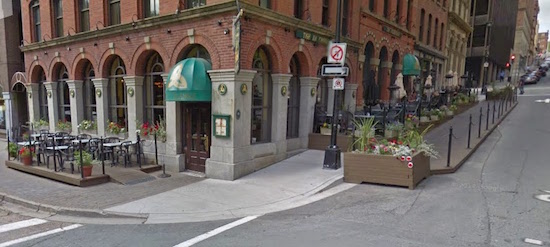23 Feb Halifax’s long chain of excuses for discrimination

Ye Olde Discriminator
Accessibility activist Gus Reed has posted an extraordinary tale of bureaucratic evasion in the quest to achieve equal treatment for Haligonians in wheelchairs. The original is richer and wittier than the following summary, but in outline:
- Nova Scotia Homebuilders’ Assoication offered its office to government advisory panel on accessibility legislation because it was free, and had an accessible washroom.
- Washroom turned out to be dangerously deficient for wheelchair users.
- Builders association produced copy of city plan it followed when building washroom.
- City compliance bureaucrat acknowledged plan is based on pre-2006 standards and therefore “moot;” promised steps to ensure it is no longer used by inspectors.
Whenever I write about this topic, my old friend and Daily News college Shaune MacKinlay, now principal advisor to Mayor Mike Savage, protests that:
- The city’s hands are tied because the provincially mandated building code exempts all but brand new buildings, and those undergo a complete change of use, which changing from a surfing supply store to a candy shop is deemed not to be. (The Homebuilder’s building was new; newer than 2006.)
- The Mayor of North America’s Most Inaccessible City has undertaken a host of initiatives to improve access.
Upon inspection, those initiatives consist mainly of happy talk resolutions, the formation of committees to pass more happy talk resolutions, and tentative steps grudgingly undertaken. For example, she boasts that henceforth, all newly purchased city buses will be fully accessible. Great, except it’s no longer possible to buy a bus that isn’t.
Gus Reed offers a couple of suggestions in case Mayor Savage ever decides to do more than talk about ending discrimination:
- Take some of the money, time, and resources currently devoted to development and promulgation of happy talk, and use it instead to train all city building inspectors in the building code’s quite thorough accessibility standards. Let the inspectors know that enforcing these standards to the limits of the law is a key objective of the Savage administration.
- Use the patio permitting process as a lever to encourage restaurants to make their establishments accessible.
Being the only restaurant on a downtown block not to have a patio might just put a restaurant out of business. Maybe ramping the steps into the restaurant interior and constructing a fully accessible washroom would suddenly seem like a worthwhile investment. To quote wheelchair user Gus:
Without such a provision, council would effectively be trading my interest in the public sidewalk for a facility that discriminates against me.
Finally, Gus comes to plans for a massive expansion of The Old Triangle, an extremely inaccessible, summertime-patio-equipped restaurant with two stepped entrances, three stepped levels, and washrooms that lie at the bottom of a long steep set of cellar stairs. The reno, to be completed in time for a May opening, will add at least one additional level with an entrance on Hollis Street.
Will this work trigger a requirement for compliance with building code provisions for accessibility?
MacKinlay can’t say. The city has received no application for the planned renovations. Compliance Manager Jim Donovan says he won’t know until the city sees more details about what’s planned (which it is now seeking).
Gus tells this story much more divertingly, including an enlightening discourse on the science of pee, and breaking the seal. Read it here.
Prediction: The Savage Administration will take no steps to train building inspectors on accessibility requirements, will not instruct them to make accessibility requirements a top priority, and will continue issuing patio permits to otherwise inaccessible restaurants. But, ooh, the happy talk will flow.
